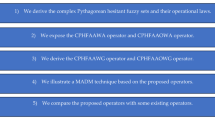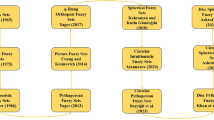Abstract
Ouyang et al. (Inf Sci 180:532–542, 2010) introduced the concept of (I, J)-fuzzy rough sets based on a pair of implications. Considering axiomatic characterization of approximation operators play a significant role in rough set theory, this paper devotes mainly to characterizing (I, J)-fuzzy rough sets based on a pair of implications from both constructive and axiomatic approaches. We firstly investigate the relationship between the lower and upper approximation operators based on a pair of ordinary implications and special fuzzy relations. And then (I, J)-fuzzy rough operators based on some special fuzzy relations are characterized by single axioms, which ensure the existence of polytypic fuzzy relations generating the same (I, J)-fuzzy rough approximation operators.
Similar content being viewed by others
References
Baczýnski M (2004) Residual implications revisited. Notes on the Smets–Magrez theorem. Fuzzy Sets Syst 145:267–277
Baczýnski M, Jayaram B (2008) (S, N)- and R-implications: a state-of-art survey. Fuzzy Sets Syst 159:1836–1859
Boixader D, Jacas J, Recasens J (1999) Upper and lower approximations of fuzzy sets. Int J General Syst 29:555–568
Chen DG, He Q, Wang XZ (2010) FRSVMs: Fuzzy rough set based support vector machines. Fuzzy Sets Syst 161:596–607
Chen DG, Kwong S, He Q, Wang H (2012) Geometrical interpretation and applications of membership functions with fuzzy rough sets. Fuzzy Sets Syst 193:122–135
Comer S (1991) An algebraic approach to the approximation of information. Fund Inf 14:492–502
Dai JH, Tian HW (2013) Fuzzy rough set model for set-valued data. Fuzzy Sets Syst 229:54–68
D’eer L, Verbiest N, Cornelis C, Godo L (2015) A comprehensive study of implicator-conjunctor-based and noise-tolerant fuzzy rough sets: definitions, properties and robustness analysis. Fuzzy Sets Syst 275:1–38
Dubois D, Prade H (1990) Rough fuzzy set and fuzzy rough sets. Int J General Syst 17:191–209
Fan BJ, Tsang ECC, Xu WH, Yu JH (2017) Double-quantitative rough fuzzy set based decisions: a logical operations method. Inf Sci 378:264–281
Klement EP, Mesiar R, Pap E (2000) Triangular norms. Kluwer Academic Publishers, Dordrecht, Boston, London
Kryszkiewicz M (1998) Rough set approach to incomplete information systems. Inf Sci 112:39–49
Li TR, Luo C, Chen HM, Zhang JB (2015) PICKT: a solution for big data analysis. Lect Notes Comput Sci 9436:15C25
Lin TY, Liu Q (1994) Rough approximate operators: axiomatic rough set theory. In: Ziarko W (ed) Rough sets fuzzy sets and knowledge discovery. Springer, Berlin, pp 256–260
Liu G (2013) Using one axiom to characterize rough set and fuzzy rough set approximations. Inf Sci 223:285–296
Lu J, Li DY, Zhai YH et al (2016) A model for type-2 fuzzy rough sets. Inf Sci 328:359–377
Ma ZM, Li JJ, Mi JS (2015) Some minimal axiom sets of rough sets. Inf Sci 312:40–54
Maji P, Pal SK (2011) Rough-fuzzy pattern recognition: applications in bioinformatics and medical imaging. Wiley
Mas M, Monserrat M, Torrens J et al (2007) A survey on fuzzy implication functions. IEEE Trans Fuzzy Syst 15(6):1107–1121
Mi JS, Leung Y, Zhao HY, Feng T (2008) Generalized fuzzy rough sets determined by a triangular norm. Inf Sci 178:3203–3213
Mi JS, Zhang W (2004) An axiomatic characterization of a fuzzy generalization of rough sets. Inf Sci 160:235–249
Morsi NN, Yakout MM (1998) Axiomatics for fuzzy rough sets. Fuzzy Sets Syst 100:327–342
Ouyang Y, Wang ZD, Zhang HP (2010) On fuzzy rough sets based on tolerance relations. Inf Sci 180:532–542
Pawlak Z (1982) Rough set. Int J Comp Inf Sci 11:341–356
Pawlak Z (1991) Rough set: theoretical aspects of reasoning about data. Kluwer Academic Publishers, Boston
Qin KY, Yang JL, Pei Z (2008) Generalized rough sets based on transitive and reflexive relations. Inf Sci 178:4138–4141
Radzikowska AM, Kerre EE (2002) A comparative study of fuzzy rough sets. Fuzzy Sets Syst 126:137–155
She YH, Wang GJ (2009) An axiomatic approach of fuzzy rough sets based on residuated lattices. Comp Math Appl 58:189–201
Slowinski R, Vanderpooten D (2000) A generalized definition of rough approximations based on similarity. IEEE Trans Knowl Data Eng 12:331–336
Song XX, Wang X, Zhang WX (2013) Independence of axiom sets characterizing formal concepts. Int J Mach Learn Cybern 4:459–468
Wang CY, Hu BQ (2013) Fuzzy rough sets based on generalized residuated lattice. Inf Sci 248:31–49
Wu WZ, Leung Y, Mi JS (2005) On characterizations of (\(I, T\))-fuzzy rough approximation operators. Fuzzy Sets Syst 15:76–102
Wu WZ, Leung Y, Shao MW (2013) Generalized fuzzy rough approximation operators determined by fuzzy implicators. Int J Approx Reason 54:1388–1409
Wu WZ, Li TJ, Gu SM (2015) Using one axiom to characterize fuzzy rough approximation operators determined by a fuzzy implication operator. Fund Inf 142:87–104
Wu WZ, Xu YH, Shao MW, Wang GY (2016) Axiomatic characterizations of (\(S, T\))-fuzzy rough approximation operators. Inf Sci 334–335:17–43
Wu WZ, Zhang WX (2004) Constructive and axiomatic approaches of fuzzy approximation operators. Inf Sci 159:233–254
Xia BH, Ge Y, Wang JF, Li DY, Liao YL, Zheng XY (2014) A method for extracting rules from spatial data based on rough fuzzy sets. Knowl Based Syst 57:28C40
Xu WH, Guo Y (2016) Generalized multigranulation double-quantitative decision-theoretic rough set. Knowl Based Syst 105:190–205
Xu WH, Li TW (2016) Granular computing approach to two-way learning based on formal concept analysis in fuzzy datasets. IEEE Trans Cybern 46:366–379
Yao YY (1998) Relational interpretations of neighborhood operators and rough set approximation operators. Inf Sci 101:239–259
Yao YY (1998) Constructive and algebraic methods of theory of rough sets. Inf Sci 109:21–47
Yao YY (1998) A comparative study of fuzzy sets and rough sets. Inf Sci 109:227–242
Zadeh LA (1971) Similarity relation and fuzzy orderings. Inf Sci 3:177–200
Zakowski W (1982) On a concept of rough sets. Demonstratio Mathematica XV:1129–1133
Zhang XX, Chen DG, Tsang ECC (2017) Generalized dominance rough set models for the dominance intuitionistic fuzzy information systems. Inf Sci 378:1–25
Zhang YL, Li JJ, Wu WZ (2010) On axiomatic characterizations of three pairs of covering based approximation operators. Inf Sci 180:274–287
Zhang XH, Zhou B, Li P (2012) A general frame for intuitionistic fuzzy rough sets. Inf Sci 216:34–49
Zhu W (2007) Generalized rough sets based on relations. Inf Sci 177:4997–5011
Acknowledgements
The authors would like to thank the anonymous referees and the Editor-in-Chief for their valuable comments. This work was funded by the National Natural Science Foundation of China (Grant Nos. 61673352, 41631179, 61573321).
Author information
Authors and Affiliations
Corresponding author
Ethics declarations
Conflict of interest
The author declares that he has no conflict of interest
Human and animal rights
This article does not contain any studies with human participants or animals performed by the authors.
Rights and permissions
About this article
Cite this article
Li, D., Wu, W. On the characterization of fuzzy rough sets based on a pair of implications. Int. J. Mach. Learn. & Cyber. 9, 2081–2092 (2018). https://doi.org/10.1007/s13042-017-0690-8
Received:
Accepted:
Published:
Issue Date:
DOI: https://doi.org/10.1007/s13042-017-0690-8




